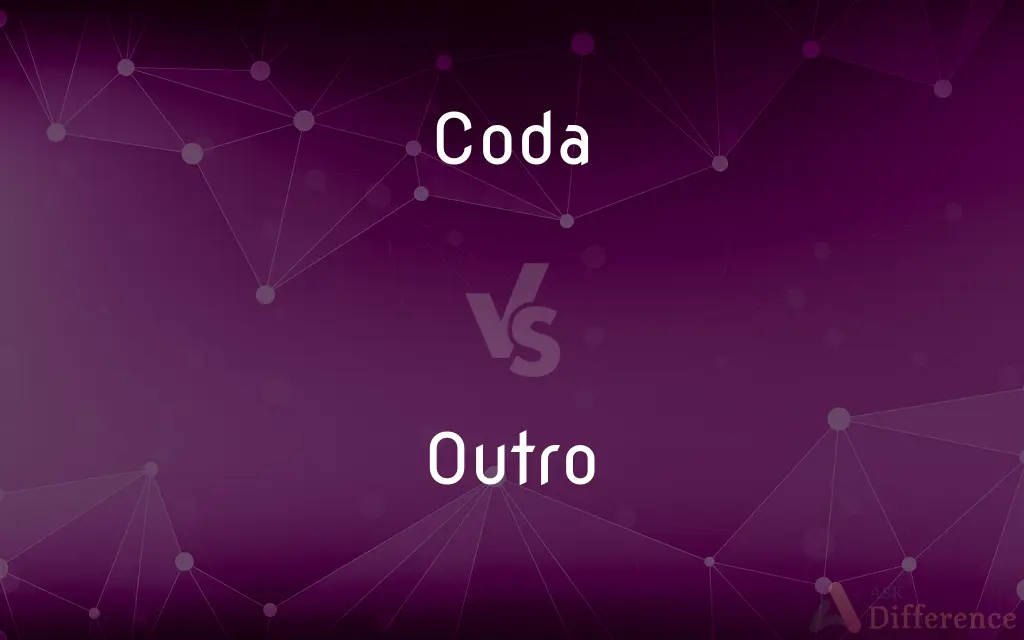Coda vs. Outro — What's the Difference?
By Fiza Rafique & Urooj Arif — Updated on April 19, 2024
Coda is a musical term for a concluding passage that rounds off a composition, while an outro refers to the ending segment of a track, often in popular music contexts.

Difference Between Coda and Outro
Table of Contents
ADVERTISEMENT
Key Differences
A coda, in music, is specifically designed to be a distinct section that concludes a musical composition, providing closure and a sense of completion. It often reiterates themes or develops them further to end on a definitive note. Whereas, an outro, often used in modern music genres like pop and rock, serves as a fade-out or a final part that signals the end of a track without necessarily introducing new themes.
Coda typically appears in classical and jazz music, emphasizing the formal structure of a piece. It is crafted to enhance the overall narrative of the composition by bringing back or embellishing motifs previously heard. On the other hand, an outro might simply decrease in volume or repeat a refrain as it ends, and is less formalized than a coda.
Codas are often marked by a specific notation in sheet music, indicating a deliberate compositional choice to add a concluding section. Outros, however, may not have a designated notation and can be as simple as the last few bars intended to wind down the piece.
In terms of listener experience, a coda can offer a powerful final statement or a complex culmination of a piece's musical ideas, often leaving a lasting impression. Conversely, an outro might aim to maintain the mood or theme of the song as it comes to a close, ensuring a smooth transition out of the musical experience.
While both terms describe endings, their usage and implications can vary significantly based on the musical genre and the artist’s intent. A coda is more about structural completion and musical summation, whereas an outro focuses on seamlessly concluding a recording, sometimes even used to segue into the next track or finish a live performance.
ADVERTISEMENT
Comparison Chart
Definition
A concluding section of a musical piece
The end part of a track or performance
Usage in Genres
Classical, Jazz
Pop, Rock, Electronic
Purpose
To summarize and enhance main themes
To signal the end of a track smoothly
Formality
Highly structured, often notated
Less formal, often improvised or fading
Listener Impact
Provides thematic closure and satisfaction
Ensures smooth exit or transition
Compare with Definitions
Coda
The final added measures of a musical composition.
The symphony's coda brought the audience to a standing ovation.
Outro
The concluding part of a radio or television program’s episode.
The show’s outro featured credits rolling over the theme song.
Coda
A concluding event, remark, or section in any flow of a narrative.
His farewell speech served as a coda to his career.
Outro
A terminal section that concludes a live performance.
Their concert outro was a spectacular firework display.
Coda
A passage that brings a piece to an end in a discrete manner.
The composer wrote a powerful coda to cap off the movement.
Outro
The final segment of a song or piece of music, often instrumental.
The outro of the song fades out with soft guitar strums.
Coda
A distinct ending part of a dance especially in ballet.
The coda of the ballet featured a spectacular solo performance.
Outro
A part of a performance or presentation that concludes the event.
The conference ended with an outro video summarizing the day's events.
Coda
A musical section that concludes a piece of music.
The coda at the end of Beethoven’s Sonata adds a dramatic finish.
Outro
The ending sequence in a video or broadcast.
The outro included acknowledgments and sponsor messages.
Coda
(Music) The concluding passage of a movement or composition.
Outro
A portion of music at the end of a song; like an intro, but at the end instead of the beginning.
Coda
A conclusion or closing part of a statement.
Outro
(informal) The closing sequence at the end of a film, television program, video game etc.
Coda
(music) A passage that brings a movement or piece to a conclusion through prolongation.
Coda
(phonology) The optional final part of a syllable, placed after its nucleus, and usually composed of one or more consonants.
The word “salts” has three consonants — /l/, /t/, and /s/ — in its coda, whereas the word “glee” has no coda at all.
Coda
(geology) In seismograms, the gradual return to baseline after a seismic event. The length of the coda can be used to estimate event magnitude, and the shape sometimes reveals details of subsurface structures.
Coda
(figuratively) A conclusion (of a statement or event, for example), final portion, tail end.
Coda
A few measures added beyond the natural termination of a composition.
Coda
The closing section of a musical composition
Common Curiosities
How does a coda affect the overall music composition?
A coda can enhance the musical journey by revisiting and concluding main themes powerfully.
Is an outro necessary in every song?
Not every song features an outro; its use depends on the artist's preference and the genre.
What is the main purpose of a coda in music?
A coda aims to provide a satisfying conclusion by encapsulating the main themes of a piece.
Is a coda only found in musical compositions?
While commonly musical, the term 'coda' can also refer to the concluding part of any narrative.
How is an outro different from a coda?
An outro is generally less structured than a coda and often involves a fade-out rather than a thematic summary.
Can all music pieces have a coda?
Not all music compositions feature a coda; its inclusion depends on the composer's intent and the style of music.
What genres typically use outros?
Outros are common in pop, rock, and electronic music genres.
How do listeners perceive the impact of a coda?
A coda tends to leave a lasting impression by emphasizing the piece's thematic depth and resolution.
What makes a coda different from a regular ending?
A coda is usually more elaborate and structured, designed to add a significant closure beyond the regular ending.
How does a coda contribute to the formality of a composition?
A coda adds to the formality by clearly defining the ending as a significant part of the structure.
Can an outro be purely instrumental?
Yes, many outros are instrumental, providing a gentle ending to the music without additional lyrics.
Does the length of an outro affect the song's ending?
Yes, the length and style of an outro can influence how abruptly or smoothly a song concludes.
Can a song have both a coda and an outro?
It's uncommon but possible, especially in complex compositions or multi-movement works.
Are outros more common in modern music compared to traditional genres?
Yes, outros are more typically found in modern music genres due to their casual and often fading nature.
What role does an outro play in live performances?
In live performances, an outro helps in transitioning the audience out of the musical experience.
Share Your Discovery

Previous Comparison
Freshman vs. Sophomore
Next Comparison
Versatile vs. FlexibleAuthor Spotlight
Written by
Fiza RafiqueFiza Rafique is a skilled content writer at AskDifference.com, where she meticulously refines and enhances written pieces. Drawing from her vast editorial expertise, Fiza ensures clarity, accuracy, and precision in every article. Passionate about language, she continually seeks to elevate the quality of content for readers worldwide.
Co-written by
Urooj ArifUrooj is a skilled content writer at Ask Difference, known for her exceptional ability to simplify complex topics into engaging and informative content. With a passion for research and a flair for clear, concise writing, she consistently delivers articles that resonate with our diverse audience.
















































